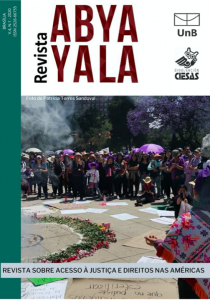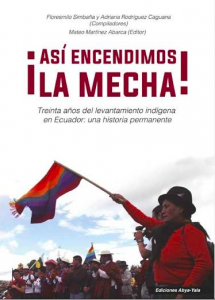
My analytical work is located at the intersection of debates on indigenous women’s identity politics in Latin America, transnational feminism, and the politics of the adoption of human rights discourse at global and local levels. I have been interested during the last years in exploring the correlation of Indigenous women’s transnational activism and the proliferation of learning experiences for building leadership capacities. In particular, I analyze the structure of opportunities that have forged the networking process of indigenous women at the continental level and how the political leverage of indigenous women leaders has been instrumental in its consolidation. In the context of Mexico, I have been involved in process of strengthening the capacities of local women leaders who want to participate in electoral and community politics alike.
I recently gained a position as CONACYT Research Fellow at the Centre of Research and Advanced Studies of Social Anthropology (CIESAS) in Mexico City. In addition, I am a resourceful and skilled online teacher of distance education programs, dedicated to teaching indigenous women leaders from different world regions. Since 2010 I became fully involved in online teaching in the Global Leadership School of Indigenous Women, sponsored by the International Indigenous Women’s Forum (IIWF).
Countries of Focus: Mexico, Nicaragua and transnational spaces created to consolidate Indigenous women´s regional organizations
Keywords: Gender, human rights, justice, indigenous identity politics, transnational activism, and political participation
chapter in book: Mujeres indígenas del Ecuador: La larga marcha por el empoderamiento y la formación de liderazgos
This essay deals with the organizational and training experience of indigenous Kichwa women in the political development of the indigenous movement of Ecuador in the last thirty years. The purpose of the essay is to make visible the participation of women in the historical account of indigenous mobilization and the constitution of what in Latin American political science literature was described and recognized as one of the strongest indigenous movements in Latin America (Zamosc, 2004). Beyond reflecting on the political changes in state-society relations in Ecuador that the indigenous movement provoked, what I want to show is the particularity of the organizational process of indigenous women being trained as leaders to impact from their experience as a woman. – res in: 1) the mixed indigenous movement; 2) in the approaches of cooperation agencies; and 3) government policies on political participation.
Academic Article: PERSPECTIVAS INTERSECCIONALES Y COMPARADAS DE LA (IN) JUSTICIA DE GÉNERO Y VIOLENCIA EXTREMA CONTRA MUJERES AFRO E INDÍGENAS
 Drawing from different contexts, from the Atlantic coast of Nicaragua to the central provinces of Canada, this special issue analyzes and documents the extreme and structural violence that affects the lives of indigenous and Afro-descendant women. Several of the essays deal centrally with femicide and its relationship with other types of violence in order to contribute to the understanding of femicide and actions in search of justice and from an intersectional reading. The political and analytical positions that inspire these reflections aim to establish a critical dialogue with both academia and anti-feminicidal feminist activism from a rooted perspective that prioritizes empirical observation and dense knowledge of contexts. The authors of this dossier contribute to open paths of understanding that reveal blindness, prejudice, and universalist views on experiences of differentiated discrimination, social damage, and claims of rights from rationalities and concrete experiences.
Drawing from different contexts, from the Atlantic coast of Nicaragua to the central provinces of Canada, this special issue analyzes and documents the extreme and structural violence that affects the lives of indigenous and Afro-descendant women. Several of the essays deal centrally with femicide and its relationship with other types of violence in order to contribute to the understanding of femicide and actions in search of justice and from an intersectional reading. The political and analytical positions that inspire these reflections aim to establish a critical dialogue with both academia and anti-feminicidal feminist activism from a rooted perspective that prioritizes empirical observation and dense knowledge of contexts. The authors of this dossier contribute to open paths of understanding that reveal blindness, prejudice, and universalist views on experiences of differentiated discrimination, social damage, and claims of rights from rationalities and concrete experiences.
Academic article: DIÁLOGOS BINACIONALES SOBRE LOS RETOS PARA DOCUMENTAR LA(S) VIOLENCIA(S) CONTRA MUJERES INDÍGENAS EN MÉXICO Y CANADÁ
 This article is based on a dialogue that inquiries about the production of knowledge on gender violence that affects indigenous women from Abya Yala and Tortuga Island. Here we critically analyze that institutional policies for the eradication of violence have not incorporated the analysis of the effects of colonial and structural violence that affects indigenous women and their peoples. It is important to reverse this omission through documentation proposals from an intersectional and reflective perspective of the contexts. We believe that it will not be possible to respond to the demands for gender justice – both in the South and in the North – if we do not challenge the racism and coloniality that mediate the relationship between the State and indigenous peoples, and that constitutes the experience of violence. against indigenous men and women.
This article is based on a dialogue that inquiries about the production of knowledge on gender violence that affects indigenous women from Abya Yala and Tortuga Island. Here we critically analyze that institutional policies for the eradication of violence have not incorporated the analysis of the effects of colonial and structural violence that affects indigenous women and their peoples. It is important to reverse this omission through documentation proposals from an intersectional and reflective perspective of the contexts. We believe that it will not be possible to respond to the demands for gender justice – both in the South and in the North – if we do not challenge the racism and coloniality that mediate the relationship between the State and indigenous peoples, and that constitutes the experience of violence. against indigenous men and women.
Academic Article: INDIGENOUS, MESTIZO & AFRO-DESCENDENT WOMEN AGAINST VIOLENCE: BUILDING INTERETHNIC ALLIANCES IN THE CONTEXT OF REGIONAL AUTONOMY
This essay analyses the contemporary activism of women’s organizations of Nicaragua’s North Atlantic Coast autonomous region. Its thesis is that the struggle against gender violence has enabled local women to develop a common agenda over and above whatever ideological–political differences and ethnic–racial hierarchies divide them. It argues that the role of Coast women activists has been central to articulating, in a reflexive way, a position as indigenous, Mestizo and Afro-descendent women in order to adapt a human rights approach to the regional political–cultural context, and to use it effectively to achieve a life free of violence.
Journalistic article: LUCHANDO CONTRA LA PRECARIEDAD LABORAL EN LA EDUCACIÓN SUPERIOR EN CANADÁ: UNA MIRADA DESDE LA DIÁSPORA ACADÉMICA LATINOAMERICANA
Inspired by the strike of teachers and education assistants at York University in Toronto, Canada that took place during the 2015 Spring, this essay reflects on the precarious working conditions of temporary teachers (contract-faculty) in higher education settings in Canada. This contribution conveys a critique of the commercialization of higher education and discriminatory labor dynamics involved. This process in North America has led to the over-exploitation of young graduates to meet the educational demand without offering in exchange decent working conditions and stable employment opportunities.
